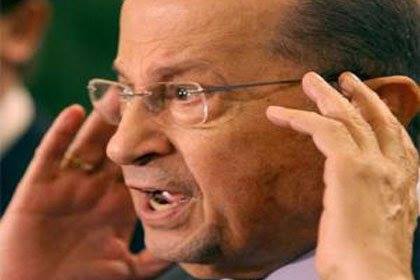Lebanon: Losers And Winners In Michel Aoun’s Presidency – Analysis
Mohammad Khajouei/Eurasia Review/November 11/16
The Gordian knot of Lebanon’s presidential election was finally cut after about two and a half years and former army commander, General Michel Aoun, whose main supporter was the Lebanese resistance movement, Hezbollah, won the parliament’s vote to win the post.
The question, however, is why this development is important and how it should be seen in the light of the political rivalries in Lebanon and ongoing regional tensions. The following points are noteworthy in this regard:
The end of the political deadlock, which had left Lebanon in limbo and faced the country with uncertainty during the past two and a half years, is per se an important point. This is especially true because Lebanon is on the verge of new parliamentary elections and establishment of the new government can take the country’s affairs back to normal. More important, however, is that getting out of this deadlock was made possible through consultations and dialogue among various Lebanese political groups.
Under conditions when many countries in the Middle East resort to military means when domestic differences soar, the people of Lebanon managed their differences properly and finally found a way out of this deadlock through the logic of partnership as well as political give and take. This proves nothing but the maturity of democracy in Lebanon; a democracy, which has been based on consensus and ethnic quotas and despite all its difficulties and hardships, perhaps can be the best model for Arab countries in the region because it satisfies all ethnic groups one way or another and prevents emergence of a dictatorship.
Those who agreed to Michel Aoun’s presidency belong to both main political currents, that is, the March 8 Alliance and the March 14 Alliance. His opponents were also as such. Therefore, no one can claim that one of those alliances has become the winner and the other one has been loser of the new political trend in the country. However, nobody can also claim that these two coalitions have a similar share of advantages under new conditions. Michel Aoun was the main presidential candidate supported by two main parties in the March 8 Alliance, that is, Hezbollah and the Christian party known as the Lebanese National Movement.
These two parties insisted on the candidacy of Aoun at a time that some of his current supporters, including Samir Geagea and Sa’ad Hariri were opposed to him. However, when the leaders of the March 14 Alliance failed to attune the presidential election process to their interests, they had to gradually change position and support Aoun. Of course, the belated support offered to Aoun by Hariri caused his supporters to gain the needed quorum at the parliament, but this also meant that Hariri was playing in the playground prepared by Hezbollah and its supporters. Of course, Hariri managed to take the prime minister’s post as a concession. In fact, Hariri preferred a relative win over a complete defeat.
Election of Aoun as Lebanon’s new president will have regional connotations as well. The main supporters of Aoun can be also considered as members of the Iran axis. So, it was not strange that Iran’s President Hassan Rouhani and Syrian President Bashar Assad were among the first foreign politicians to congratulate Aoun on his win. It was also not strange that Iran’s Foreign Minister Mohammad Javad Zarif was the first high-ranking foreign official to travel to Lebanon following the election of Aoun. General Aoun has been among supporters of Bashar Assad and also Hezbollah’s military presence in Syria for years.
Despite some people like Hariri, he believes that presence of Hezbollah in Syria has assured Lebanon’s security and has prevented Takfiri terrorists from pouring into this country. Saudi Arabia, which was among the most important supporters of the March 14 Alliance and especially Sa’ad Hariri, has been witnessing a remarkable decline in its influence on Lebanon’s politics and has not been able to take the initiative in the course of determining the country’s president. Of course, it seems that Lebanon is no more the first priority for Saudis, who are ow intensely involved in such crises as the war in Yemen and Syria. On the whole, election of Aoun to presidency in a country, which has common borders with Syria, will play an important role in bolstering the front that supports the incumbent Syrian government.
The importance of presidency in Lebanon is not because of the powers it has, but is because of its symbolic position at the gravitational center of all political groups in the country.
Although the deadlock surrounding election of Lebanon’s president has been shattered, this can be also the beginning of a new round of differences and maybe new conflicts in the country. The new cabinet is supposed to represent the entire political spectrum.
This will be good because all political groups will be satisfied with having a share of power and it will also boost overall solidarity in Lebanon, but it can also lead to conflicts among positions that these groups hold on various issues. Lebanon is to hold new parliamentary elections next May. One of the main bones of contention has been the issue of changing the election law; the same law according to which the forthcoming elections are going to be held. Apart from this, a major sticking point is the position that the new Lebanese cabinet will take on the ongoing developments in Syria.
While some cabinet members support the government of Bashar Assad and consider it as the legitimate government of Syria, others consider it as totally illegitimate. It is natural that presence of these conflicting views in the government may lead to challenges. On the other hand, Michel Aoun, as the new Lebanese president, and Sa’ad Hariri, as the new Lebanese prime minister, hold totally different views on the situation in Syria. Hariri even announced recently that he would not allow Lebanese minsters to travel to Syria. This comes at a time that the Syrian government has an ambassador in Lebanon. Therefore, it seems that the issue of Syria will continue to overshadow the political atmosphere in Lebanon.






















